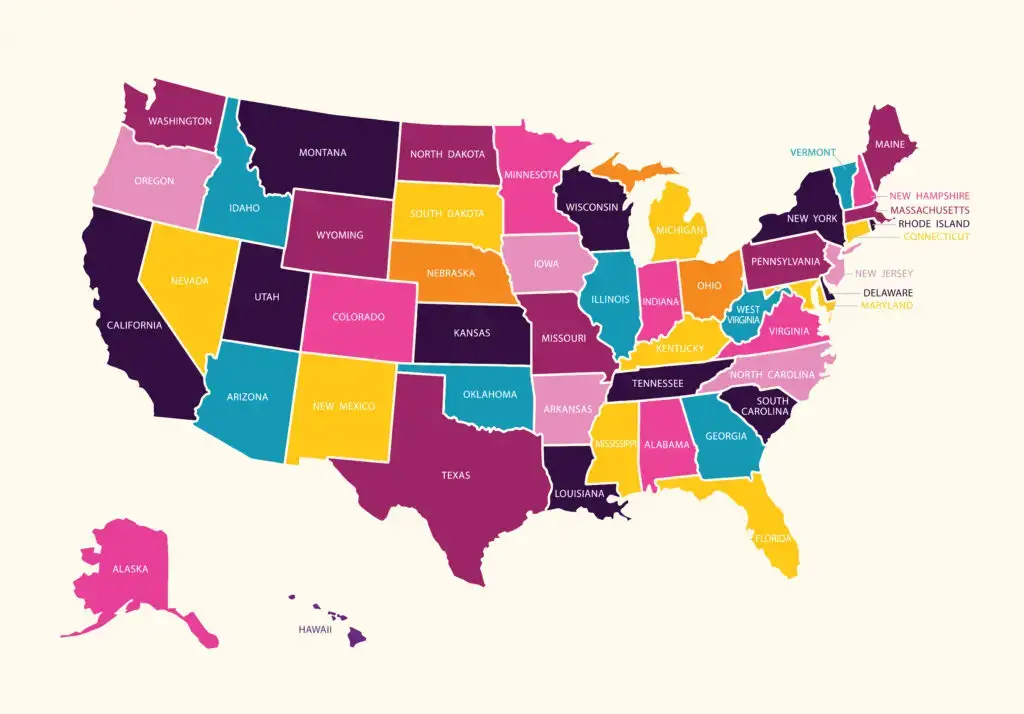When deciding to build your family through surrogacy or to become a surrogate, one of the most important factors you have to think about first is where you live. Not every state in the United States is as supportive of surrogacy as other states. Some are extremely welcoming and offer many resources to families, while others have highly restrictive legal processes and limited access to top-notch fertility clinics. Knowing whether or not you live in a surrogacy-friendly state is important in choosing the next steps for your surrogacy journey.
What Is Surrogacy? Traditional vs. Gestational Surrogacy
One way that states may differ in terms of surrogacy is the type of surrogacy a state may allow. The two types of surrogacy are traditional surrogacy and gestational surrogacy. Each state may have different rules depending on which type of surrogacy you’re considering.
Traditional Surrogacy
With traditional surrogacy, a surrogate becomes pregnant via intrauterine insemination (IUI). This is a type of artificial insemination where the surrogate becomes pregnant with the intended father’s sperm or donor sperm using her own eggs. Because the surrogate uses her own eggs, she is biologically related to the child she carries for the intended parents. For this reason, some states tend to have stricter laws around traditional surrogacy than gestational surrogacy. For example, in Delaware, if there is a biological connection between the baby and the surrogate, intended parents face legal hurdles in having their names put on the baby’s birth certificate.
Gestational Surrogacy
In gestational surrogacy, a surrogate becomes pregnant via in-vitro fertilization (IVF). In this process, a surrogate will not use her own eggs. Instead, eggs from the intended mother or donor eggs are fertilized with sperm from either the intended father or from a donor. The embryo that results from this is then transferred to the surrogate’s uterus.
The main difference between traditional surrogacy and gestational surrogacy is that in gestational surrogacy, the surrogate does not use any of her own eggs, and she has no biological connection to the child she carries.
Factors That Make States Surrogacy-Friendly
There are a few factors that can help determine whether or not a state is “surrogacy-friendly.” Typically, a state is considered surrogacy-friendly if it has clear laws that recognize and allow surrogacy and a strong legal history of ruling in favor of surrogacy.
Typically, surrogacy-friendly states, like California, will allow surrogacy for all types of families, including those part of the LGBTQIA+ community, single parents, and parents who are not married. States that are surrogacy-friendly will also recognize and enforce surrogacy contracts and grant pre-birth orders.
Surrogacy in surrogacy-friendly states also tends to be more accessible and affordable. Some states, like Nevada, even have special laws that provide some level of insurance coverage for surrogates in a surrogacy arrangement.
However, states that are considered non-surrogacy friendly either do not have legal statutes in place that recognize and enforce surrogacy contracts or outlaw surrogacy entirely. Some states have guidelines that prohibit compensation for surrogacy or deny the granting of pre-birth orders. Non-surrogacy friendly states also often require more legal obstacles to complete the surrogacy process.
There are also some states that fall in the middle of being surrogacy-friendly and non-surrogacy friendly. These are typically states that might have some helpful provisions that benefit surrogacy families but also have some additional legal challenges.
Here’s a useful checklist to help determine whether or not a state is surrogacy-friendly:
✔ The state has clear-cut laws about legal parentage for surrogacy families.
✔ The state allows surrogacy contracts to be legally enforced.
✔ There are legal protections in place for both surrogates and intended parents.
✔ Intended parents can obtain a pre-birth order to put their names on the surrogate baby’s birth certificate.
✔ There are many easily accessible and affordable fertility clinics, medical facilities, and surrogacy agencies that service the state.
✔ The state has an affordable cost of living.
✔ The state is inclusive toward all types of families, including single parents, unmarried parents, and parents in the LGBTQIA+ community.
The Most Surrogacy-Friendly States in the United States
Our state surrogacy map offers a complete breakdown of each state’s surrogacy-friendly status, but for a quick reference, we have compiled a list of the best states for surrogacy in the United States. These states have established favorable legal environments and supportive frameworks for both intended parents and surrogates.
Some of the most surrogacy-friendly states in the United States are:
- California
- Colorado
- Connecticut
- Delaware
- Maine
- Montana
- Nevada
- New Hampshire
- New Jersey
- Rhode Island
- Oregon
- Vermont
- Washington
If you don’t see your state on this list, that doesn’t necessarily mean your surrogacy journey has to come to a screeching halt. It just means that you have to do a little more research to understand what your next step is. Talking to a legal professional or surrogacy agency is a great way to learn more.
The Value of Keeping an Open Mind About Surrogacy States
While the legal landscape of surrogacy varies across states, it’s important to approach the process with an open mind. Just because a state doesn’t offer a pre-birth order doesn’t automatically mean it’s a “bad” choice for surrogacy. Here’s why:
- Diverse Legal Frameworks: Each state has its unique legal framework, and what might seem restrictive in one context could be beneficial in another. For instance, while some states might not offer pre-birth orders, they might have other supportive measures in place that can be advantageous for intended parents.
- Personal Connections: Sometimes, the best match for a surrogate or intended parents might be in a state that doesn’t fit the typical “surrogacy-friendly” mold. Personal compatibility, shared values, and mutual trust can play a significant role in a successful surrogacy journey.
- Financial Considerations: The cost of living and medical expenses can vary significantly from state to state. A state that might not be the most surrogacy-friendly in terms of legal processes might offer more affordable options for the medical and logistical aspects of surrogacy.
- Legal Expertise: With the right legal guidance, many of the challenges associated with surrogacy in less-friendly states can be navigated successfully. Experienced surrogacy attorneys are well-versed in the intricacies of state laws and can provide strategies to ensure the best possible outcome for all parties involved.
- The Bigger Picture: The surrogacy journey is multifaceted, and while legal considerations are crucial, they are just one piece of the puzzle. Emotional support, medical expertise, and the overall well-being of the surrogate and intended parents are equally important.
While it’s beneficial to be aware of the legal landscape in various states, it’s equally important not to narrow down options solely based on the presence or absence of specific legal provisions. Every surrogacy journey is unique, and with the right support and resources, intended parents can find the best path forward, regardless of the state’s legal stance on surrogacy.
We’re Here to Support You
No matter where you are, we’re here to support you in answering any questions you may have as you explore the possibilities and consider the best options for your surrogacy journey.
If you’re unsure if your state is surrogacy-friendly or concerned about the surrogacy laws in your state, we can help. Give us a call to receive comprehensive guidance throughout your surrogacy journey.

